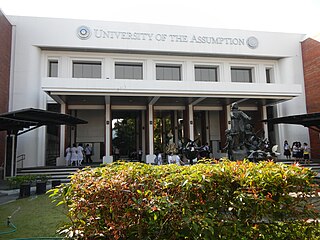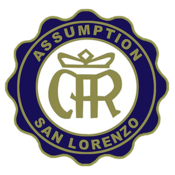
San Beda University is a private Catholic coeducational basic and higher education institution run by the Order of Saint Benedict in San Miguel, Manila, Philippines. It was founded by the Benedictines in 1901. The main campus is situated in Mendiola, San Miguel, Manila and provides tertiary education. It has a satellite campus that provides elementary and high school education in Taytay, Rizal.

Lyceum of the Philippines University, also referred to by its acronym LPU, is a private, non-sectarian, coeducational higher education institution located at intramuros in the City of Manila, Philippines. It was founded in 1952 by José P. Laurel, who was the third president of the Republic of the Philippines.

National University (NU), colloquially National U, is a private non–sectarian coeducational university located in Sampaloc, Manila, Philippines. The founder of the university, Mariano F. Jhocson Sr., established the institution on August 1, 1900, as Colegio Filipino in Quiapo, Manila. It is considered as the first private nonsectarian and coeducational institution in the Philippines and also, the first university to use English as its medium of instruction, replacing Spanish.

The University of the Assumption (U.A.) is a private archdiocesan Catholic university in the City of San Fernando, Pampanga, Philippines. The University of the Assumption is the first Catholic archdiocesan university in the Philippines and in Asia. It is among the top schools in the region, based on its accredited programs, and licensure and professional examination results.

Eva Estrada Kalaw was a Filipina politician who served as a senator in the Senate of the Philippines from 1965 to 1972 during the presidency of Ferdinand Marcos. She was one of the key opposition figures against Marcos' 20-year authoritarian rule and was instrumental in his downfall during the People Power Revolution in 1986. As a senator, she wrote several laws relating to education in the Philippines, such as the salary standardization for public school personnel, the Magna Carta for Private Schools, the Magna Carta for Students, and an act to institute a charter for Barrio High Schools. She was also among the Liberal Party candidates injured during the Plaza Miranda bombing on August 21, 1971.

Saint Scholastica's College, also referred to by its acronym SSC or colloquially St. Scho, is a private Catholic basic and higher education institution for women founded and managed by the Congregation of the Missionary Benedictine Sisters of Tutzing in a 3.66 hectares (36,600 m2) lot in Malate, Manila, Philippines. It was established in 1906 initially offering elementary academic programs. It started admitting high school students in 1907 and opened its collegiate department in 1920. It pioneered in formal music education in the Philippines, opening a Conservatory of Music in 1907.

Miriam College is a non-stock, non-profit Filipino Catholic educational institution for girls and young women in Quezon City, Philippines.

The Manuel L. Quezon University (MLQU) is a private, nonsectarian, coeducational basic and higher education institution in Diliman, Quezon City, Philippines. It is named after the second president of the Philippine Manuel L. Quezon.

Assumption Antipolo is a private, Catholic, all-girls basic education institution run by the Religious of the Assumption in the city of Antipolo, Rizal, Philippines. It was established by the Assumption sisters in 1974.
The University of the Cordilleras, formerly known as the Baguio Colleges Foundation (BCF), is a private coeducational university in Baguio, Philippines. Founded by Benjamin R. Salvosa and his wife Evangelina D. Salvosa in 1946, it offers programs at the elementary, secondary, undergraduate and graduate levels catering to around 21,000 students.
Maria Teresa Aquino-Oreta, better known as Tessie Aquino-Oreta, was a Filipina politician. She was the chairperson of the Senate Committee on Education, Arts and Culture in the 11th Congress.
The Philippine Bar Examinations is the professional licensure examination for lawyers in the Philippines. The exam is exclusively administered by the Supreme Court of the Philippines through the Supreme Court Bar Examination Committee.

Juan Felipe de Jesús Nakpil, KGCR, KSS known as Juan Nakpil, was a Filipino architect, teacher and a community leader. In 1973, he was named one of the National Artists for architecture. He was regarded as the Dean of Filipino Architects.

St. Paul University Quezon City (SPUQC), also referred to as SPU Quezon City, is a private, sectarian and coeducational university located in New Manila, Quezon City, Philippines. It was previously an all-girls' school and turned co-ed beginning school year 2006-2007.

St. Theresa's College of Quezon City, also called by its acronym STC, is a private Catholic basic education institution for girls run by the Missionary Sisters of the Immaculate Heart of Mary in Quezon City, Metro Manila, Philippines. It was officially established on January 7, 1947, by the ICM Sisters but opened only in June 1947.
Assumption Iloilo is a private Catholic coeducational basic education institution run by the Sisters of the Religious of the Assumption in Iloilo City, Philippines. It was founded by the Assumption Sisters in 1910. It offers preschool, grade school, and high school education for males and females.

Sixto Serrano Brillantes Jr. was a Filipino election lawyer who was the chairman of the Commission on Elections from 2011 to 2015. He was appointed by President Benigno Aquino III on January 16, 2011, to serve the unexpired term of Chairman Jose Melo.

Taft Avenue is a major road in the south of Metro Manila. It passes through three cities in the metropolis: Manila, Pasay, and Parañaque. The road was named after the former Governor-General of the Philippines and U.S. President, William Howard Taft; the Philippines was a former commonwealth territory of the United States in the first half of the 20th century. The avenue is a component of National Route 170 (N170), a secondary road in the Philippine highway network and the entirety R-2 of the Manila arterial road network.
Notre Dame – RVM College of Cotabato is a private, Catholic basic and higher education institution run by the Congregation of the Religious of the Virgin Mary in Cotabato City, Maguindanao, Philippines. It was established by the RVM Sisters in 1904. Notre Dame - RVM College is a member of the Notre Dame Educational Association, a group of schools named Notre Dame in the Philippines under the patronage of the Blessed Virgin Mary. Alumni and students of the institution are often called as RVMians or Marians.

Pedro Gil Street is an east-west inner city street and a tertiary national road in south-central Manila, Philippines. It is 3.65 kilometers (2.27 mi) long and spans the entire length of Ermita, Malate, Paco, and Santa Ana. The street is served by the Pedro Gil LRT Station along Taft Avenue and the Paco railway station along Quirino Avenue. It also continues towards the central Metro Manila cities of Mandaluyong and San Juan across the Pasig River as New Panaderos and General Kalentong Streets.



















